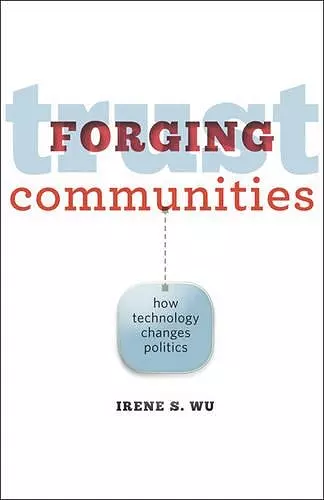Forging Trust Communities
How Technology Changes Politics
Format:Paperback
Publisher:Johns Hopkins University Press
Published:4th Aug '15
Currently unavailable, and unfortunately no date known when it will be back

Accessible and engaging, Wu's book merges the practical with the scholarly to embed the current, Internet-led information revolution's effects on collective action and governance within a historical perspective, weaving together a wealth of diverse and expansive cases. -- Catie Snow Bailard, George Washington University, author of Democracy's Double-Edged Sword: How Internet Use Changes Citizens' Views of Their Government
Scholars and students in political science, public administration, international studies, sociology, and the history of science and technology will find this to be an insightful and indispensable work.Bloggers in India used social media and wikis to broadcast news and bring humanitarian aid to tsunami victims in South Asia. Terrorist groups like ISIS pour out messages and recruit new members on websites. The Internet is the new public square, bringing to politics a platform on which to create community at both the grassroots and bureaucratic level. Drawing on historical and contemporary case studies from more than ten countries, Irene S. Wu's Forging Trust Communities argues that the Internet, and the technologies that predate it, catalyze political change by creating new opportunities for cooperation. The Internet does not simply enable faster and easier communication, but makes it possible for people around the world to interact closely, reciprocate favors, and build trust. The information and ideas exchanged by members of these cooperative communities become key sources of political power akin to military might and economic strength. Wu illustrates the rich world history of citizens and leaders exercising political power through communications technology. People in nineteenth-century China, for example, used the telegraph and newspapers to mobilize against the emperor. In 1970, Taiwanese cable television gave voice to a political opposition demanding democracy. Both Qatar (in the 1990s) and Great Britain (in the 1930s) relied on public broadcasters to enhance their influence abroad. Additional case studies from Brazil, Egypt, the United States, Russia, India, the Philippines, and Tunisia reveal how various technologies function to create new political energy, enabling activists to challenge institutions while allowing governments to increase their power at home and abroad. Forging Trust Communities demonstrates that the way people receive and share information through network communities reveals as much about their political identity as their socioeconomic class, ethnicity, or religion. Scholars and students in political science, public administration, international studies, sociology, and the history of science and technology will find this to be an insightful and indispensable work.
Wu has given us an important book of ideas, presented with clarity and originality, that could go a long way toward helping us keep up with - and understand the vast implications of - the technology swirling around us. Hill Rag
ISBN: 9781421417264
Dimensions: 216mm x 140mm x 11mm
Weight: 227g
176 pages